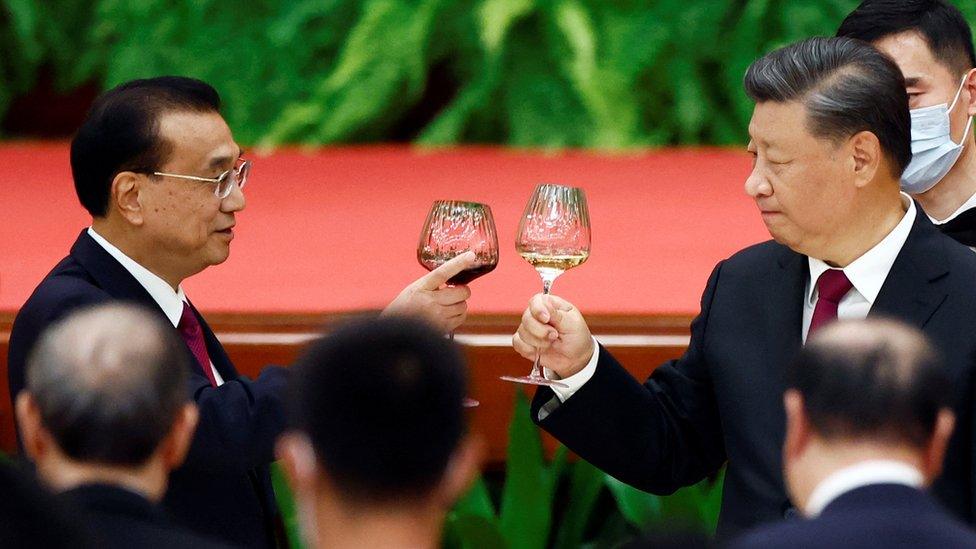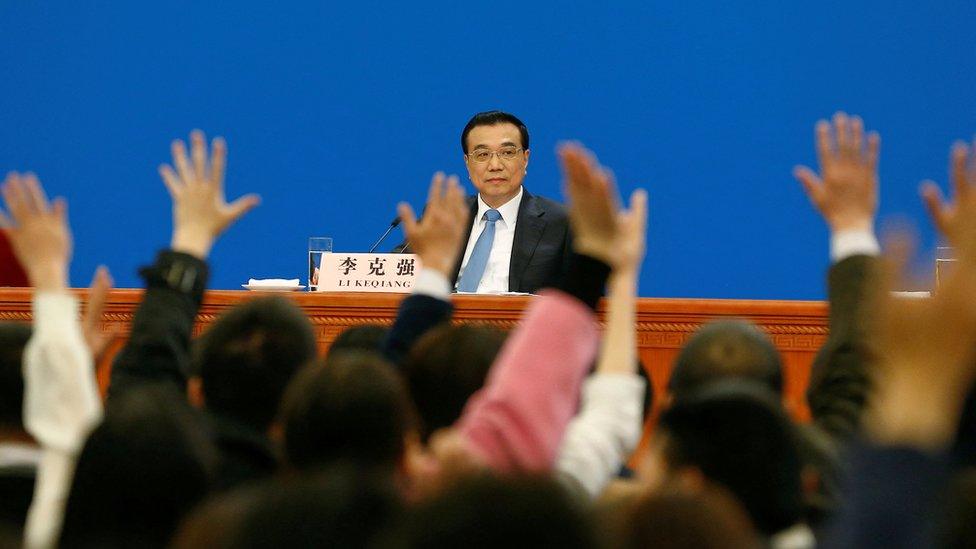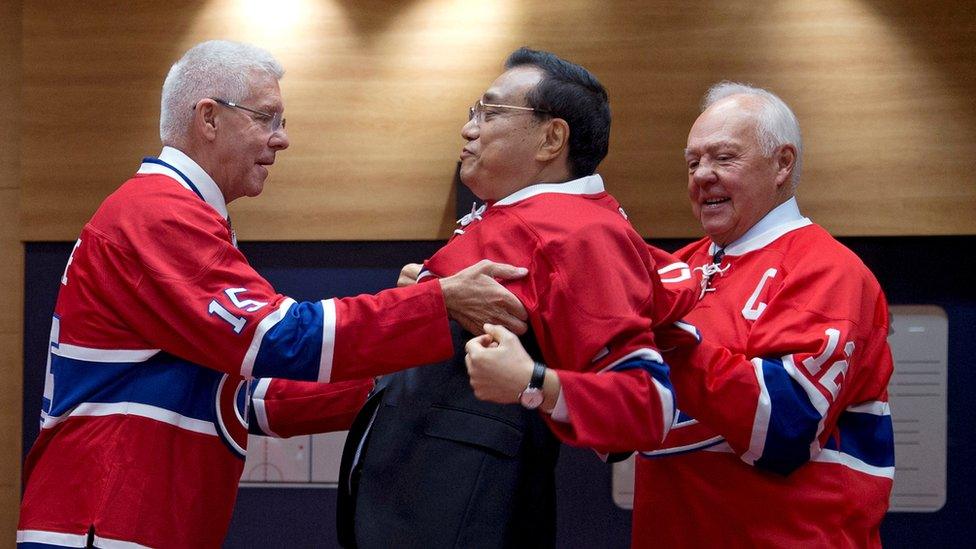Why Li Keqiang's death is dangerous for Xi Jinping
- Published

The death of a leader in China can usher in big changes, it did after Mao Zedong, or can lead to political upheaval, like it did when grieving for Hu Yaobang morphed into the 1989 Tiananmen Square protests.
For this reason, the passing of former premier Li Keqiang has already triggered various measures to ensure that stability is maintained.
A crackdown on VPN use is under way to reduce the access of Chinese citizens to the parts of the internet not controlled by the Communist Party.
The Party doesn't want mourning for a popular, liberal, former number two leader to generate wider criticism of the current administration, led by Xi Jinping.
It is not just that Li died so suddenly, suffering a heart attack just months after stepping down, but because of what he represented: a way of potentially governing China with different priorities to those of the General Secretary Xi.
He was a bright pragmatist who didn't seem so concerned with ideology. And this is one reason why he cut such a lonely figure in the previous, seven-man Politburo Standing Committee, the country's most powerful decision-making body.
Then there's what would become known as the "Li Keqiang Index" which was born via a famous US state department memo, and came to light in Wikileaks. As the then Party Secretary of Liaoning Province, Li is said to have told the US ambassador in 2007 that the local GDP figures were unreliable as a way of judging economic health.
He reportedly said that he used three other indicators to analyse growth: railway cargo volume, electricity consumption and bank loan disbursements.
Criticising China's official statistics, even behind closed doors, to the Americans cannot have gone down well with his political opponents.
The former premier was considered one of the smartest political figures of his generation. He was accepted into the prestigious Peking University Law School soon after the universities were reopened following Chairman Mao's disastrous Cultural Revolution.
In a Party dominated by engineers, he was an economist, who become known for "telling it like it is" by honestly and publicly acknowledging China's economic problems as a means of finding solutions to them.

Journalists raise their hands during a press conference by Mr Li in March 2017
During the recent pandemic, he spoke about the damage which Mr Xi's signature zero-Covid approach was doing to the economy, and to ordinary Chinese.
Naturally, he didn't question the country's paramount leader directly, or the policy itself, but he didn't sugar coat the impacts of the amelioration measures either.
In May 2022, during a virtual meeting said to involve more than 100,000 government and business representatives, he first spoke highly of the "effective work" from officials facing "unexpected challenges" during the crisis but then he went on: "The difficulties, in some areas and to a certain degree, are even greater than the severe shock of the pandemic in 2020."
He added that there was a clear way forward, saying that "development is the basis and key to solving all problems in China". It's worth noting that he said development, not ideological vigour.
"To do a good job of epidemic prevention and control, we need financial and material resources. We need development to support stable employment, people's livelihoods and risk prevention," he said.
In May last year, with the zero-Covid policy still in place, he appeared unmasked at a university in Yunnan province. And neither the students nor officials gathering around him were wearing masks. This spurred viral discussion on social media, with posts praising the premier. Soon the hashtag #PremierAtYunnanUniversity was being censored.
In 60 seconds: Who was China’s Li Keqiang?
During the first year of Covid, as the person technically in charge of the economy, Li decided to promote the job creating capacity of street stalls and was seen visiting street vendors in Shandong Province. Business was already heading into difficult waters, and he said that this type of commerce could add vitality and create more jobs.
Almost immediately, street vendors were back on the streets of Beijing, after having been banned for years. But they were never going to be allowed to stay, not under Mr Xi's vision of what the Chinese capital should look like.
Within days of Li's so-called push to revive street stalls, the move was already being undermined in the Beijing Municipal Party Committee's newspaper, The Beijing Daily. It ran a commentary saying that street stalls were "unhygienic and uncivilised". Other state media then joined with similar messages.
That the city government could so quickly - and so publicly and effectively - overturn a suggested policy by the premier of the country, showed just how limited his power had become.
Under the previous government of Hu Jintao, with its collective leadership, this would not have been possible. Various factions within the Party had to be balanced.
But under Mr Xi it is either the Xi Jinping way or the wrong way.
Before Li stepped down in March this year, he was the last senior government figure linked to the Hu-era and its way of doing things.
His presence represented another time, a less politically zealous approach, which focused more on business activity than party sloganeering.

Mr Li dons a Montreal Canadiens NHL hockey jersey during a visit to Canada in 2016
As a fluent English speaker, he could be very charming when meeting foreign leaders. He would also wave and smile to journalists gathering to film his official meetings.
That his death has come just months after the unexplained removal of the high-profile Foreign and Defence Ministers has only added to its potential sensitivity.
The coming official ceremonies remembering him will be handled very carefully, lest they even slightly prompt a sympathetic view of the former Premier which might conflict with government's current path.
Those watching Chinese social media platforms will be monitoring the outpourings of sadness and shock online, as ordinary people remember him.
Li came through the ranks of the Communist Party at the same time as Mr Xi and, at one point, was in the running to become General Secretary himself, instead of Mr Xi.
Much speculation has been made of what China might have been like now, had Li taken the reins as paramount leader.